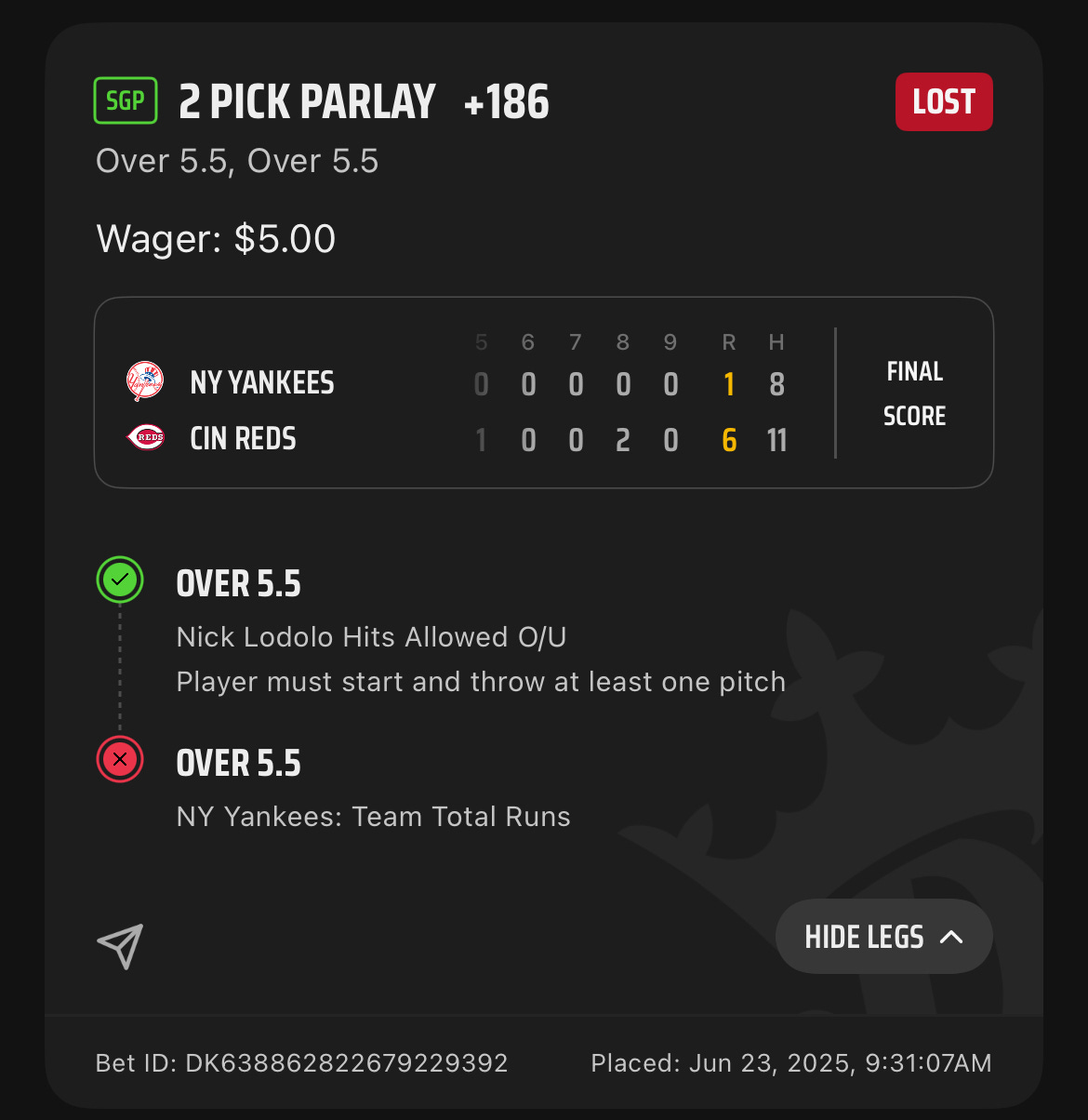1 minute and 35 seconds.
That’s the amount of time it took me to sign up for unlimited access to the sports betting market.
Another 90 seconds and I had placed my first wager, led onward by bright green letters which instructed me to “bet $5 and get $150 instantly in bonus bets.”
That’s a 3000% multiplier — great deal if you ask me.*
I’m an aspiring New Yorker, so I placed money on the Yankees, betting that opposing pitcher Nick Lodolo will allow at least 6 hits and the Yankees will score at least 6 runs. This was an aggressive wager, but not an unreasonable one (or so AI tells me).
If I’m lucky, I will have some good news to share with the not-insignificant portion of colleagues and contractors that I see speculating on the same type of games every single day. I mean, if you’ve never walked in on a coworker dual-screening his computer with emails on the left and stock market charts on the right, then you are either self-employed, their manager, or in ministry.
Of course, there is nothing surprising about the fact that people gamble — I am certainly not making any moral judgments about it. But I am astounded at how easy it’s become. Gone are the days when my aunt would pile my brothers and me into her minivan to purchase some scratch-offs from the local gas station. Each of us would be given a penny to scrape off the latex layering and then spend the next few minutes deciphering the underlying symbols which, at the time, seemed like ancient hieroglyphs. Nowadays, the gas stations aren’t needed. There is an app for all of Vegas’ most infamous pleasures and every mobile device is a pocket-sized casino.
What The Research Says
According to the latest research, global sports betting is a $329 billion industry, with the US market ($13B) growing 25% year over year since its legalization in 2018. The age group that bets the most are 25 to 34-year-olds, with 34 percent having gambled in the last year. Statistically speaking, if you know a sports bettor, chances are that he is a young male with an extroverted personality and really likes alcohol.
Oh, shoot… that's me.
With a 90-second onboarding duration, it is no surprise that researchers from USC discovered online queries for gambling addiction spike in states where sports betting is legalized. Earlier this month, a morbid op-ed in The Atlantic detailed the influx of broken gamblers that are showing up to the therapy couch. The increased accessibility to penny stocks, prediction markets, and fantasy sports has not only made it easier to place wagers, but has made it easier to keep a gambling addiction secret. Once again, I reiterate the importance of incentives.
Truth be told, this newsletter began as a tribute to friction and an argument for the utility of making certain things difficult to access. I still stand by that. Yet, getting more informed about this booming industry has put me in a sober mood. There are no easy solutions and I don’t have solid recommendations; but if we are being sincerely data-driven, then we must admit all the indicators are saying this will not end well for our young people (and especially our young men). Sports gambling and wage-making probably have their place, but what happens in Vegas is now happening everywhere, all the time, and I think the current socio-economic climate is complicated enough without leaving our young people’s futures — quite literally — up to chance. Agreed? Let me know in the comments or a message. And if you have friends or family that like to place the occasional wager on a stock or football game, no shame — just don’t forget to ask them if they’re okay every once and a while.
Oh, yeah… I lost my five dollars.
*not sponsored by DraftKings (obviously)






